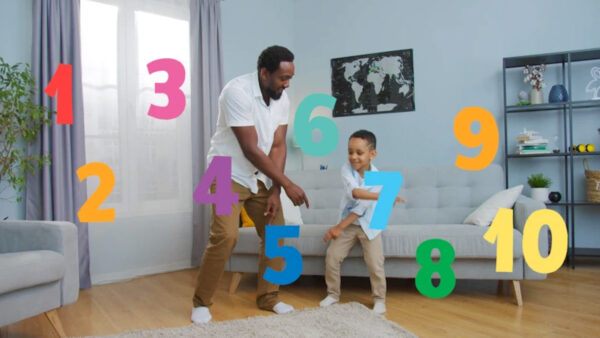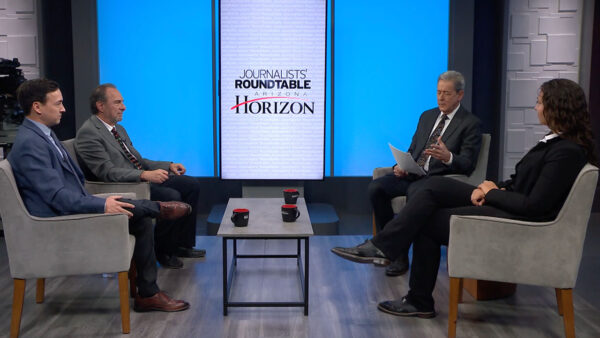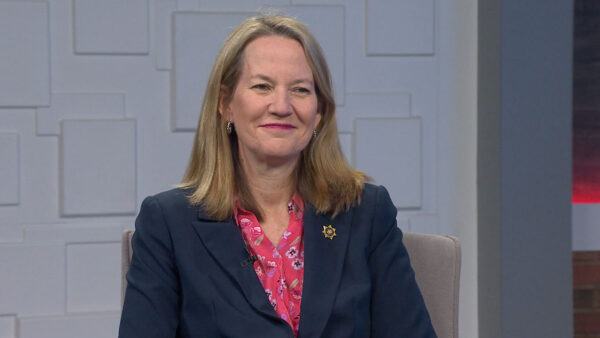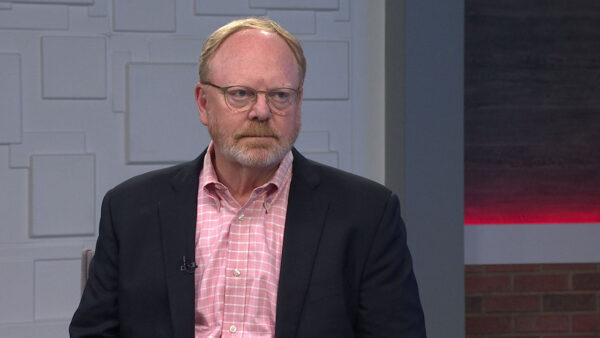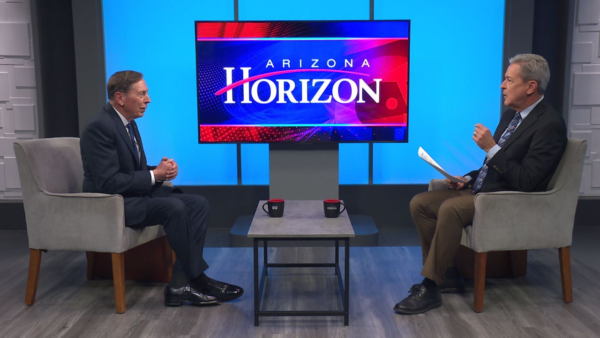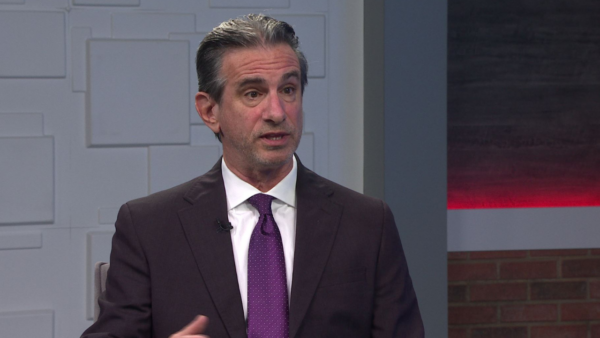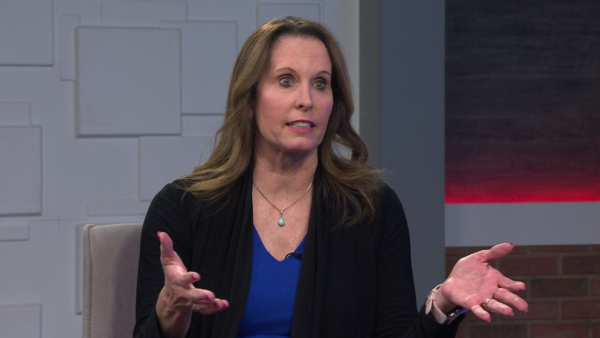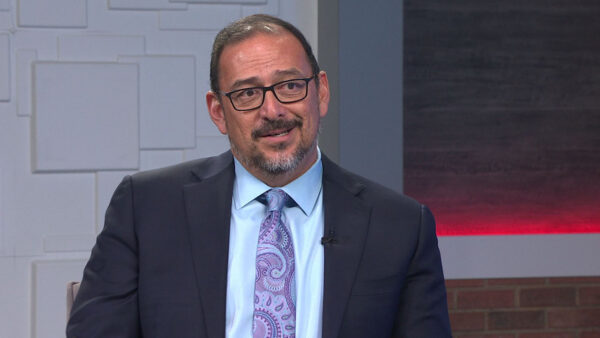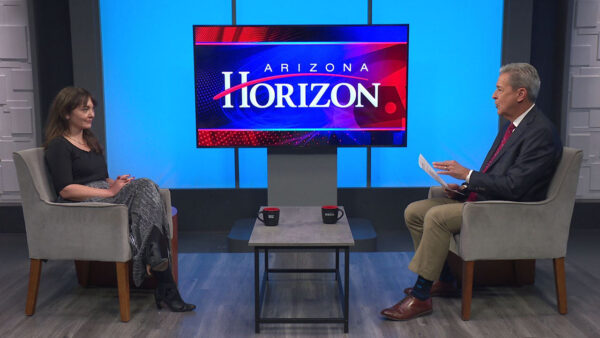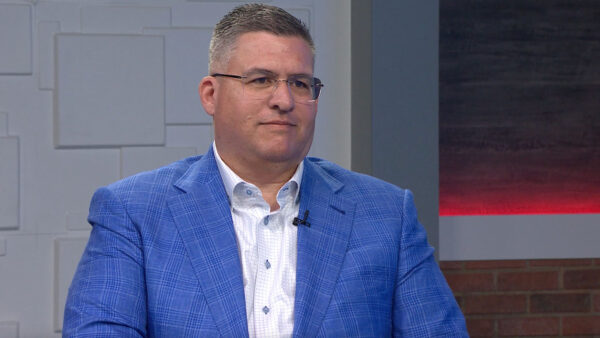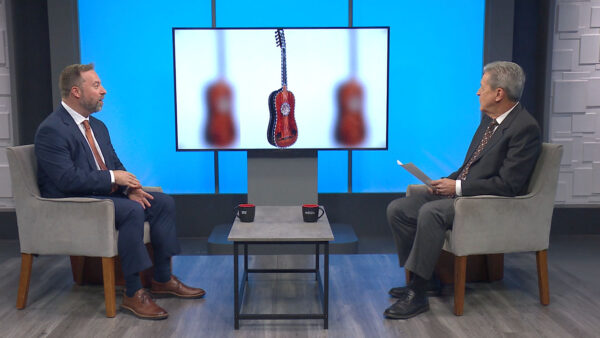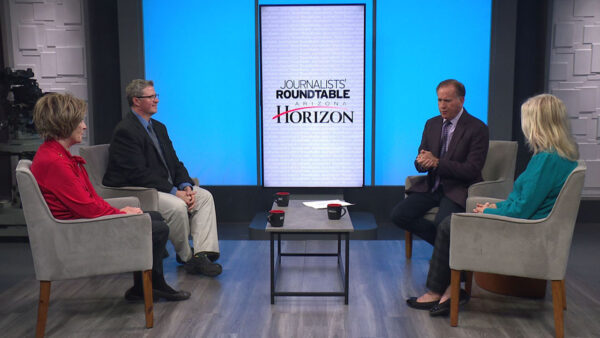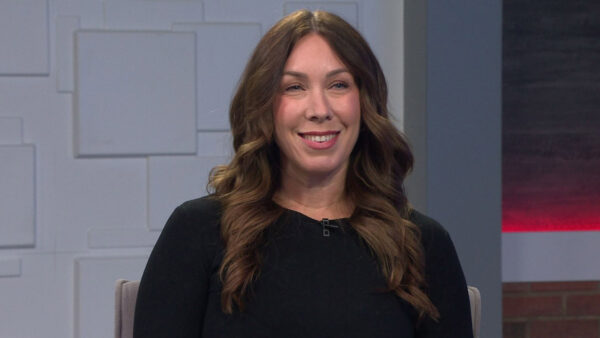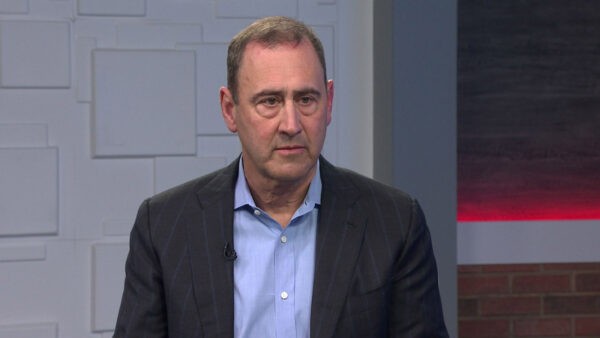We’ll show you how the Suns-Diamondbacks Education Academy in the Phoenix Union High School District is taking students who are close to dropping out and helping them graduate. Most of the students come from impoverished backgrounds and face difficult life circumstances that create obstacles to graduation. We’ll also have a discussion of what those circumstances are and what is being done to help students overcome them. Dr. Kent Scribner, Superintendent of PUHSD, Cyndi Tercero, Dropout Prevention Program coordinator for the district, and Dr. Steven W. Green, principal of Skyline High School in Mesa, will discuss drop out issues.
Ted Simons: Tonight's edition of American Graduate features a panel discussion on the many life circumstances that can lead to a student dropping out of school. The nation's high school graduation rate hit 80% and in Arizona 75% earned high school diplomas. For some groups the number is much lower. More schools are offering specialized programs to meet those students. Christina Estes and Kyle Mounce take us to the Suns-Diamondbacks Academy in Central Phoenix.
Mr. Bates: This is a multiple choice question.
Jacqueline Rodriquez: He's really nice, he's goofy, Mr. Bates.
Mr. Bates: This is the only correct answer.
Christina Estes: It's the last day in Mr. Bates' classroom for Jacqueline Rodriguez. She's graduating from the academy. She started here six months ago after spending two years away from school.
Jacqueline Rodriquez: I had to go to Mexico, my mom, she's not from the United States so we had to go back to Mexico. She fixed her visa and we came back. I tried going to a school in Mexico but it was so different. I know Spanish but not really good, like to their level. It was really hard.
Christina Estes: When she returned to Arizona Jacqueline says her mom pushed her to earn a diploma. But going back to the high school she left didn't feel right.
Jacqueline Rodriquez: I felt like I didn't belong there anymore because my class already graduate.
Rick Beck: A lot of them take they were not dropouts but were kicked out or withdrawn because of their absences. We dig a little deeper to find out why they missed so much school.
Rick Beck: We have a lot of students that work. We have students that have their own children. We had a few married couples here that had children and there are so many reasons why they are here.
Christina Estes: When the Suns-Diamondbacks academy opened in 2001 it had 30 students. Today it has 250.
Rick Beck: I think it's the old thing about having one adult person care about you really makes a difference in the world.
Christina Estes: Threw accelerated classes and personalized attention students like Jacqueline can get more credits in less time.
Jacqueline Rodriquez: you get to know your teachers and they get to know your situation and what's going on. You're not just another student here, everybody knows you.
Christina Estes: New classes start every six weeks and twice a year diplomas are handed out. The principal is preparing for the his 27th graduation ceremony.
Rick Beck: Sometimes I have to step back because I get very emotional and I do the Walter Mitty dance behind the hoed ium just to collect myself. We've had a lot of students write letters over the years thanking me for giving them the chance. A lot of them come back and give me hugs. So that's why I do it.
Jacqueline Rodriquez: I'm not oldest and my other little sister she's in first great. She's seven years old. Yeah, my mom says go to school, I want to you graduate like your sister. And I'm like her example basically.
Christina Estes: What an example she's setting. Jacqueline is now applying for college and plans to become a computer programmer.
Ted Simons: The Suns-Diamondbacks academy will move to a new facility next year with twice the space so accommodate up to 400 students. Joining me to talk about issues that can lead to students dropping out is Cyndi Tercero, dropout prevention coordinator for the district. And Dr. Kent Scribner, superintendent of the Phoenix high school district. And Dr. Steven green, principal of skyline high in Mesa. Good to have you here. What did you think of the Suns-Diamondbacks academy?
Cyndi Tercero: Amazing story since the campus opened. It's been one of those safety nets for our students who haven't been successful in a traditional campus. For me, to know there's a place we can refer them and provide those safeties and securities so they can be successful, it's a blessing.
Ted Simons: And that school is associated with the Phoenix high school district, correct?
Kent Scribner: It's one of our small specialized schools that offers a smaller environment, more of a family feel, relationship-based student population of about 300 students.
Ted Simons: Over in Mesa, similar kind of academies or schools?
Steven Green: We have the same sorts of opportunities for students, that's the first time I had heard about that program from Phoenix. We try to establish those relationships as was mentioned in the video, and try to help support our students that way.
Ted Simons: We're talking about life's circumstances and the impact. Talk to us about that, what you see, what you hear and the impact.
Cyndi Tercero: Well, I think the bigger story there is dropout prevention really is about eliminating barriers to learning. Whatever that barrier is for the student. And looking at the individual situation, and finding out what the root cause is. So by building those relationships and asking those questions we can address the issue for that student. One of the really exciting things when we restructured our dropout prevention programs we created two positions to really focus on this. Our student liaison works directly with students and prevents attendance interventions and dropout follow-up. Then a liaison to work with students directly to provide those resources and support. Our dropout rate went from 22% to 10%. It's continued to go down because we've continued to think outside the box and offer more and more opportunities for kids to be successful.
Ted Simons: You mentioned root causes. What are some of the root causes you've experienced?
Kent Scribner: At Phoenix Union, we serve a low-income student population. 84% of our students are at or below the principal poverty line, defined as a family of four living on $29,000 or less. That's the reality for 84% of our students. With challenges of poverty come other kinds of obstacles, social and emotional networks that we must provide in our schools so that students can be successful in the classroom.
Ted Simons: Obstacles you've seen and experienced and how you're addressing them in Mesa.
Steven Green: Absolutely. We have about 55% of our students in the free and reduced lunch program. It's really, how do we take a large excellent of high schools, and make those connections with kids. The traditional school of 20 or 30 years where everyone's a part of the team or a club or sports works for many of our students. We have students who get there at 6:45 and stay to 5:00 so there's a lot of dedication. We have to be there to support them in their time of need. They are taking care of younger brothers or sisters or grandparents. We have to be flexible to meet their needs on our campus and other places off campus, as well.
Ted Simons: Is there a way to -- obviously you deal with high school students for the most part. But before they get to high school there is a way to say, we need to watch that one. I should pay attention to that one.
Cyndi Tercero: Yeah, we're a unified district or just a union high school district. We work really well with our partner districts to already start to build those relationships. We go out and do presentation tots eighth grade students and parents to talk about the supports we offer. They will share with us students we know initially need to have those supports in place. Students may be on an attendance contract as soon as they start high school. But more for a supportive way. We make sure it's delivered that way. It's about building the relationship, we want you to check in every day, let us know if you need anything, what's going on. When I talk about the root cautious it's what's keeping them from coming to school, what is the true issue. Sometimes it's a simple solution. Earlier this year we had a student that didn't have tennis shoes. He had flip-flops and it was really cold this year. So for that student that was the issue. Provide him with some shoes.
Ted Simons: Very interesting. You just don't think that's going on. It's going on a lot. As far as, though, how young and what are the signals? I would imagine, yes, clothing and other peer pressure kind of things. But it's so hard to know an individual kid.
Kent Scribner: And Phoenix Union serves 27,000 high school students but we have 135,000 students in our K-12 pipeline. We must make data informed decisions. Look at chronic absenteeism, challenges that students v speak with principals, assistant principals and counselors. An early warning system is important. They drop out in sixth and seventh grade when they become disconnected emotionally, disconnected socially and behaviorally. It shows up when they can legally drop out.
Ted Simons: Once that disconnect happens and they come to Skyline High School, we know it's happening, it's happening as we speak, what do you do to turn that around?
Steven Green: I think we can in a lot of cases and that's what we strive for, making those connections and relationships and providing that help and support. Identifying them and convincing them that it's not punitive to get some extra help before or after school or to meet with your teacher. We have trig no, ma'am tree kids who come in and meet with the teacher before and after school. It may need to happen with some students in algebra class. Those are some amazing educators that are trying everything they can. Absenteeism, transience, all of those are factors that are difficult for any educator to overcome. Four years of math to graduate now, we can identify in ninth grade if you fail algebra it's challenging to get back on path and be able to graduate with your peers.
Ted Simons: Is there a concern with discipline? And how does discipline play into this whole formal laugh finding, turning around? You know discipline's always a problem at some level. How do you handle that?
Cyndi Tercero: One of the other things we did quite a few years ago, we wanted to have some alternatives to suspension. We traded some mandated interventions for students to learn some resiliency, schools, decision making, anger management skills. How to address the behaviors that got them into trouble in the first place. Not just sending them for the vacation of off campus suspension. Our complete rates went up for mandated intervention and our discipline referrals went down.
Ted Simons: You can teach them. What do you do to get that mind excited about what you're saying?
Cyndi Tercero: They have an additional caring adult on the campus. If they have a time they are feeling really stressed out or they feel like they might act out, they know who to go whistleblower through. How do you cope and who can you go to on the campus. Advisory programs where students know that advisory teacher is a person they can connect to. Our evening school programs, having several opportunities. Because what works for this student might not be what works for this other student.
The discipline aspect of all this, what do you see?
Kent Scribner: I see safe and orderly campuses across our district. Are there plenty of myth busy low-income and minority students. You'll find plenty of counselors, nurses, intervention specialists, very, very important parts of the program. If you speak to classroom teachers they recognize the importance of that social safety net for our students.
Ted Simons: Again, I'm not saying that it's rampant anywhere, I was in high school, I know what discipline problems are. You can't fool me, they are out there and they exist. How do you handle that on those you see may not be on the right path?
Kent Scribner: In Mesa or Trevor Brown with 3,200 students, it's about trying to create smaller communities, schools within schools. Building those kinds of relationships. In Phoenix Union we're focused on preparing students to college, career and life. That has to with the social and emotional development of teenagers.
Ted Simons: That social and emotional development.
Steven Green: Our school motto, we talk about creating a legacy of excellence. As nineth graders come in, what legacy do you want to leave? What are those decisions you're making on a daily basis? What are the perseverence skills you need to overcome some of the challenges that happen to all of us? How do you reach out to a teacher? It's not a bad thing.
Ted Simons: Quickly, are you optimistic about the graduation rates in Arizona?
Cyndi Tercero: Absolutely.
Ted Simons: How about you?
Kent Scribner: As long as we invest in our students as the assets that they are and not look at them as problems, I am optimistic.
Steven Green: We have wonderful teachers working every day and I challenge students to take advantage.
Ted Simons: Wonderful discussion, thank you.
Group: Thanks.
Dr. Kent Scribner:Superintendent, Phoenix Union High School District; Cyndi Tercero:Dropout Prevention Program Coordinator, Phoenix Union High School District; Dr. Steven W. Green:Principal, Skyline High School;
